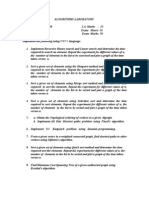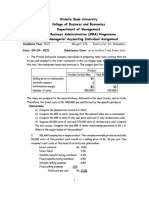0% found this document useful (0 votes)
11 views34 pagesAlg Programs
The document outlines various searching and sorting algorithms, including Linear Search, Recursive Binary Search, and Insertion Sort, along with their implementations in C. It also covers graph algorithms such as Breadth First Search, Depth First Search, Dijkstra's algorithm for shortest paths, Prim's algorithm for Minimum Cost Spanning Tree, Floyd's algorithm for All-pairs-Shortest-Path, and Warshall's algorithm for transitive closure. Each section includes code snippets and sample outputs demonstrating the functionality of the algorithms.
Uploaded by
ManimekalaiCopyright
© © All Rights Reserved
We take content rights seriously. If you suspect this is your content, claim it here.
Available Formats
Download as DOCX, PDF, TXT or read online on Scribd
0% found this document useful (0 votes)
11 views34 pagesAlg Programs
The document outlines various searching and sorting algorithms, including Linear Search, Recursive Binary Search, and Insertion Sort, along with their implementations in C. It also covers graph algorithms such as Breadth First Search, Depth First Search, Dijkstra's algorithm for shortest paths, Prim's algorithm for Minimum Cost Spanning Tree, Floyd's algorithm for All-pairs-Shortest-Path, and Warshall's algorithm for transitive closure. Each section includes code snippets and sample outputs demonstrating the functionality of the algorithms.
Uploaded by
ManimekalaiCopyright
© © All Rights Reserved
We take content rights seriously. If you suspect this is your content, claim it here.
Available Formats
Download as DOCX, PDF, TXT or read online on Scribd
/ 34




























































































